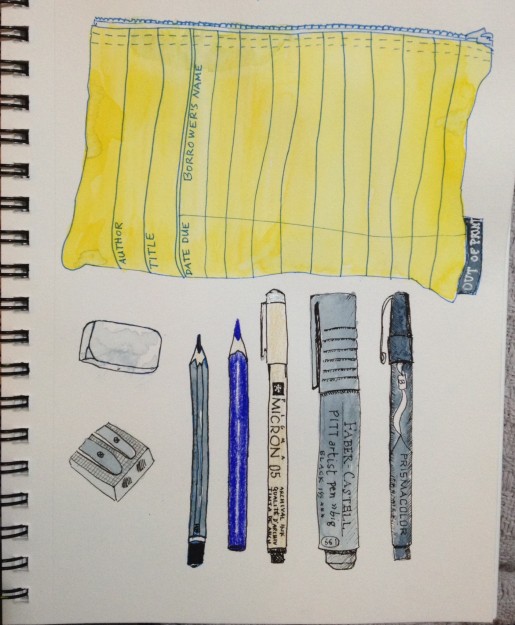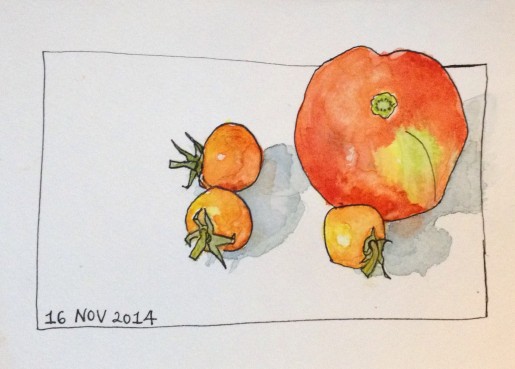Learning in Public
Something I think is wonderful about social media is the way so many creative people share their efforts and progress in various arts. I don’t just mean professional artists sharing their finished work, though of course that too is a great delight—this abundance of gorgeous, polished photography and painting and stories and poems and quilts and handwovens and other creations we find displayed all over the internet. Just Google artist sketchbook blog and you could be absorbed for weeks upon weeks.
But even more so, I appreciate the working-it-out pieces, the I’m-undertaking-something-new-and-here’s-how-it’s-going-so-far posts. Years ago, a bunch of us were doing this with quilting—posting pictures of our blocks, sometimes the first ones we’d ever made, crooked seams and all. You see it often with knitting and sewing and all kinds of handcrafts. Look what I made! I know it isn’t perfect, but… Sometimes shy, sometimes fearless, always inspiring, this sharing of incremental progress.
Even people who are accomplished in one aspect of an art sometimes do what I’ve come to think of as “learning in public” when they undertake another aspect of it—a kind of unabashedness I thoroughly respect, since it means admitting to gaps in skills or knowledge, but speaks to a desire to always be learning, always be stretching one’s abilities. I think about the very wise advice of that great sage, Ms. Frizzle: “Take chances! Make mistakes!” Our mistakes are what spark growth.
Certainly you may challenge yourself in private, and do plenty of chance-taking and mistake-making without an audience. Most people do, I think. Or they do it in the context of a relatively intimate setting: a knitting club, an improv class, a private piano lesson. I understand that, I respect that desire for privacy. But it makes me all the more grateful to see someone willing to fumble along in public, so to speak, encouraging the rest of us by posting rookie work online. Then, too, you create an archive of progress, not just for yourself but for future students of the art.
Lisa Congdon, a very accomplished artist, decided to improve her lettering skills by posting a handlettered image on her blog every day for a year. Every day of 2012, she shared her work. About a hundred days into the project, she wrote:
Hand lettering everyday is a lot more challenging than I thought it would be. Some days it feels really fun. Some days it feels like a chore (and I have to redo something 5 times to get it as right as I can). I do like the discipline of the process. When I did my first daily project in 2010, I felt the same way. The daily encouragement from people who read my blog and follow me on twitter also helps tremendously!
Artist Jennifer Orkin Lewis (I’ve posted about her before) does a daily 30-minute painting in her sketchbook and posts each page on Instagram. They are a feast for the eyes, let me tell you. In an interview with Lisa Congdon, Jennifer said, “I decided to post them all on Instagram to hold myself accountable to painting everyday.” I think there’s a lot to be said for using a blog or other public medium to help yourself stick to a goal—spurred on both by the sense of accountability Jennifer describes, and the encouragement and support Lisa speaks of.
***
I wrote the above more than a week ago and left it sitting in drafts because—despite everything I said up there—I personally feel really shy about sharing my rookie drawing and painting efforts. (Confession: the one time I went to a karaoke party, I was dying to get up and sing—and would have died before I’d have volunteered.)
This morning Tammy Garcia posted the following at Daisy Yellow:
When I started drawing I didn’t know that I would or could get better. I thought that people were either born with innate drawing talent or they were not. Perhaps they skipped the queue. But the truth for me has been that my coordination and control have improved over the years. If you are having trouble getting the pen to do what you want it to do. Maybe you just need to draw more lines.
When I started drawing in about 2008, I was an accountant – a financial analyst – with no particular drawing skill set. I started drawing doodly lines simply to pass the time while my kids were doing stuff. I drew in moleskine journals. On airplanes, at swimming lessons, while the kids splashed in the tub, at Starbucks and book stores.
The boxes looked like wonky kites. Parallel lines intersected instead. Circles looked like cracked eggs.
But looking back, I can see that every time I challenged myself to try something new {what about a mandala without any curved lines? what about ivy leaves that cover each page? what about a mandala where the lines focus on negative space? what about a new alphabet?} I made a step forward. In understanding, in pen control, in art. With trial & error & practice, I now know how hard to press, how to move my arm, my hand, to get a reasonable facsimile of a straight line. I can draw curves. I still can’t draw great faces, but I believe that one day I will.
(Read the rest—there’s a lot more including a list of ways to improve your line work.)
Tammy teaches online art classes and sends out regular art-journaling prompts that inspire masses of people. What a delight to see her discussing her (relatively recent) learning curve. I was nodding excitedly as I read along, because I’ve been drawing lines almost obsessively ever since taking Lisa Congdon’s Creativebug course in early October—pages and pages of scallops or triangles or short parallel lines in interlocking patterns. It’s meditative and relaxing, a good busying-of-the-hands for me when I want to think for a bit. But mostly I’ve been doing it simply for the pure pleasure of feeling the line. Of making my pen do what I want it to do. Of figuring out, bit by bit, how to do it better.
Now Rilla and I are watching all these Koosje Koene drawing videos and I’m trying to push a little farther. This month my sketchbook is full of staplers and tape dispensers and colored pencils—whatever’s lying around on my desk when I sit down to draw. I’m working on watercolor, too. SO MUCH TO LEARN. Scott gets cross with me when I start pointing out all the flaws in my work—he thinks I’m way too hard on myself, being a novice and all—but I remind him that as professional writers, our entire day is laced with editing and revising—the constant practice of seeking out places in our writing that could be made better, stronger, zingier, lovelier, fresher, truer, something-er. I don’t feel pained about cataloguing the ways a drawing isn’t there yet. I enjoy it, actually. Especially since reading that Ira Glass quote and recognizing that it’s my “killer taste” that allows me to see the weaknesses in my own work.
Because at the same time that I’m self-critiquing, I’m also feeling a tremendous sense of pleasure in having a Finished Thing I Made. This was a bit of a revelation I had the other day after I painted these tomatoes from my garden. It’s my first real attempt at a proper watercolor. And even as I was scrutinizing its shortcomings, I felt giddy: there it is. This thing I made. In one sitting! I’ve been working on my current novel for four years. Even books I’ve written quickly took months—and then another year or more to reach publication day.
I can grow a tomato in my sketchbook in an hour. To me it feels like magic.
I don’t think I’m brave enough to commit to posting a daily drawing—much as I would like the accountability and encouragement! But maybe I’ll try to keep learning in public once in a while. Something I want my kids to know is that you have to be not-great at something on your way to getting better at it.



